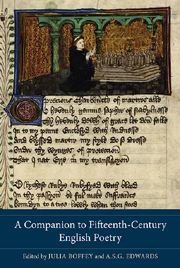Introduction
Published online by Cambridge University Press: 05 July 2013
Summary
The scholarly study of fifteenth-century English verse is very much a late twentieth-century phenomenon. A number of the writings associated with the fifteenth-century authors covered in this collection of essays were not accessible in usable editions until some point in the twentieth century, and the critical tendency to overlook fifteenth-century poetry was in part an inevitable result of its simple unavailability. But the early decades of the twentieth century saw significant changes in the landscape of fifteenth-century verse, attributable largely to the efforts of dedicated individuals working in isolation. Henry Bergen, most significantly, produced in the first two decades of the twentieth century notable editions of the two longest poetic works of the fifteenth century, John Lydgate's Troy Book and Fall of Princes, each over 30,000 lines (Bergen 1906–35 and 1924-27). The work of Eleanor Hammond on fifteenth-century manuscript and textual culture in England generated partial editions and an important survey of fifteenth-century poetry in the form of English Verse between Chaucer and Surrey (1927). And Walter Schirmer's study of John Lydgate, published originally in German in 1952 and translated into English in 1961, offered a Kulturbild, a historical and cultural analysis of the most prolific poet of the century that has still not been superseded. These figures stand apart from a general tendency to see the verse of the period between Chaucer and the early sixteenth century as largely unrewarding.
- Type
- Chapter
- Information
- A Companion to Fifteenth-Century English Poetry , pp. 1 - 4Publisher: Boydell & BrewerPrint publication year: 2013



